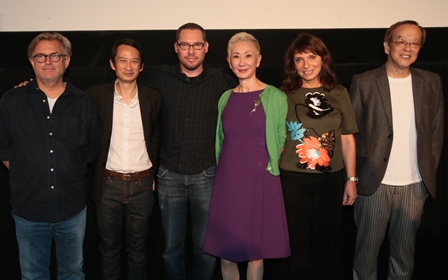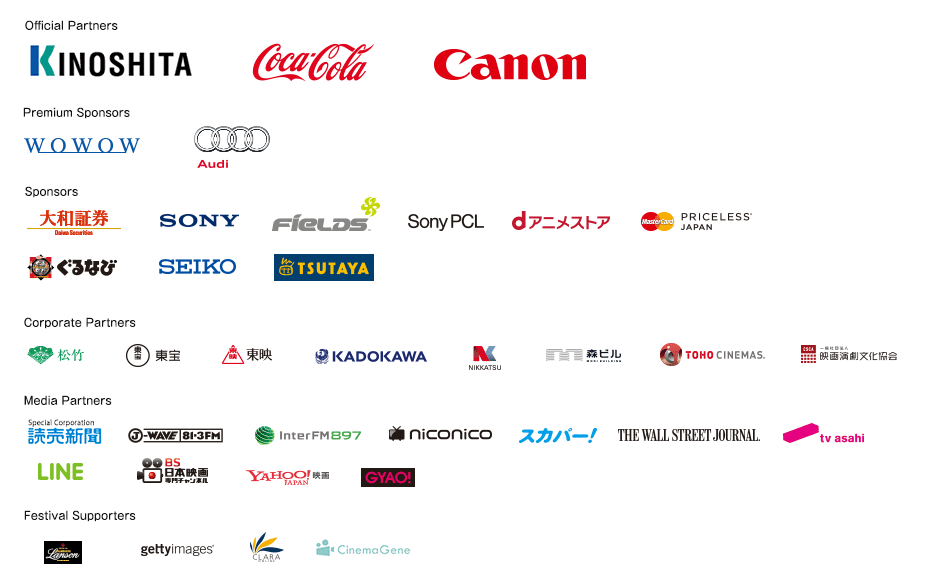
The six members of TIFF’s Competition jury, hailing from six nations and each armed with an impressive range of festival awards and box office successes, already seemed like old friends at a press conference on Friday morning, October 23.
Relaxed and bantering throughout, they responded to questions about their criteria for selecting the winning films, their personal influences, their expectations and what they feel are the hallmarks of a great film festival.
Jury President Bryan Singer joked, “I have a hangover — I just want to put that out there. [Laughter] It was your party, okay? That’s a good start — a good party.” The prolific writer-director-producer of such hits as The Usual Suspects and the X-Men series, then sobered up. A great festival, he said, is “a festival with a very diverse group of films, that isn’t afraid to take a variety of genres, and that isn’t pretentious. Pretentious is boring. So I think this will be a very exciting one.”
His fellow jurors clearly agreed. The 28th TIFF has 16 films in competition for the Tokyo Grand Prix, Special Jury Prize, Award for Best Director, Award for Best Actress/Actor, and Award for Best Artistic Contribution, including three titles from Japan—the first time in a decade that so many homegrown films are in contention. As it turns out, Japanese film has played a key role in the lives and careers of the jury members, from the work of Akira Kurosawa and Yasujiro Ozu to Godzilla.
Director Kazuki Omori, the only Japanese juror, noted: “Mr. Kurosawa’s Red Beard really influenced me to go to medical school. But when I was in medical school, and watched it again, it made me realize, wait a minute, what I really want to do is direct films!”
“I feel inspired by Mizoguchi, Ozu, Naruse, Kurosawa, but also Yanagimachi, Hashiguchi, Kore-eda,” enthused Vietnamese-French juror Tran Anh Hung, who directed the acclaimed adaption of Haruki Murakami’s novel Norwegian Wood in 2011. “They give me a lot of pleasure and the energy to make my own films.”
Recalled Singer, “As a film student at USC, we’d go to the Little Tokyo Cinema and we would see every Kurosawa film, and we became obsessed. From a young age, it was a combination of Spielberg, Lucas and their inspiration, Kurosawa. I became entrenched in Japanese cinema from an early age.”
Although the jurors did not list the precise criteria they would adopt to select the award-winning work, they were united about what they hope to find: films that move them, that invite them in, that connect.
Said Bent Hamer: “Of course it’s hard to compete in any art form… it’s not like sports.” The director of last year’s TIFF Competition film 1001 Grams, which was also Norway’s official entry for the Academy Awards, offered: “It’s what takes us. We are also an audience, not just professionals.”
Susanne Bier agreed. “I think it’s about being engaged and somewhat, being seduced. You don’t want to be forced into emotions. You want to forget that you’re watching a movie.” The Oscar®-winning writer-director also mentioned, “It’s a completely different platform at festivals. These films are not necessarily aimed at commercial audiences, so they can be sometimes tedious and sometimes utterly fascinating.”
Veteran Hong Kong producer Nansun Shi, making her 100th visit to Japan (“I love Japanese food”) agreed: “For me, it’s whether you can connect to the movie, and that connection is very difficult to describe. After I watch a movie, no matter the genre, I like it when it enriches or enhances me; that moves me the most.”
Hung added, “For me, a good movie is one that has the right language to deal with the subject or story of the movie. No matter what genre, it’s the specific language. If it has that quality, then it’s a good movie.”
Omori, who has directed some 30 titles since leaving medical school, said that he’s looking forward to seeing how the many changes in the film industry are being reflected in the lineup. “TIFF is celebrating its 30th anniversary this year. It’s gone from the 20th to the 21st century, and the film industry itself has gone through some revolutionary changes.”
After a photo call that looked like a comedy version of the police lineup in Singer’s The Usual Suspects, off the jurors went to watch films… and maybe even to collaborate. When Singer heard Bent Hamer described a story he hopes to film about a dead man whose four ex-wives portray him in completely different ways, he said, “Sounds like The Big Chill meets Raise the Red Lantern. If you need a producer, let me know!”
[Jury Press Conference write-up — K. Severns]






















